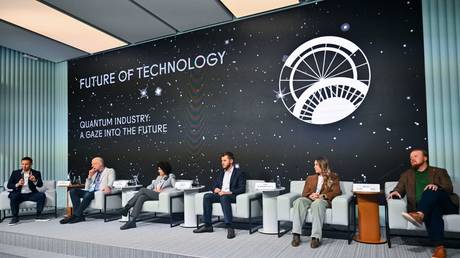Science
Global Symposium Examines Technology’s Role in Cooperation

The future of technology will be shaped not by the technology itself, but by the intentions behind its use, according to Rodrigo Andres Quevedo Silva, president of the Chilean Robotics Association. Speaking ahead of the Second International Symposium ‘Inventing the Future’ in Moscow, slated for October 7-8, 2023, Quevedo Silva emphasized that technology should act as an “extension of a person’s will, never a replacement.”
Technological Sovereignty in Focus
According to Quevedo Silva, technological sovereignty is crucial for nations to shape their futures independently, without needing external approval. He clarified that achieving this does not mean creating every component from scratch. Instead, it involves having the knowledge and capacity to adapt existing technologies to meet local needs.
This perspective is gaining traction in Latin America, where many are advocating for the development of local startups and laboratories. “We are the engine. We are the ones out on the streets, seeing problems up close,” he remarked, highlighting the importance of grassroots innovation.
He believes that governments should support tech startups rather than establish state-owned AI enterprises. “Obtaining an electronic component should not be a bureaucratic nightmare,” he stated, emphasizing the need for funding directed at solving specific issues rather than merely generating academic publications. “Investing in people,” he added, is equally vital for fostering innovation through education and training.
Fostering Global Cooperation
Quevedo Silva identified distrust among nations and companies as a significant barrier to global collaboration. Both governments and businesses often prefer competition over cooperation, leading to a “lack of a common language – not only technical, but also ethical.” He advocated for promoting “collective advancement with friendly countries” to foster mutual learning and benefit humanity as a whole.
“We must start building those bridges, even if small, to generate trust and show that by sharing basic knowledge, we all go further and faster,” he said.
On the topic of ethical standards, he noted that Chile has made strides in regulating brain-computer interfaces and neuro-rights to the extent that these have been included in the constitution, positioning the country as a pioneer in this emerging field.
The upcoming ‘Inventing the Future’ symposium will host over 200 speakers, including scientists, architects, designers, and diplomats from across the globe, including regions such as Africa, Latin America, and Southeast Asia. The event will feature approximately 50 activities segmented into three thematic areas: society, technology, and global cooperation.
Participants will engage in a variety of discussions, master classes, and project laboratories focusing on urgent topics like demographic challenges, urbanization, biotechnologies, artificial intelligence, and humanitarian cooperation, particularly with Africa and the Global South.
As technological innovation continues to advance, the discourse surrounding its ethical use and the potential for international collaboration remains increasingly vital. The insights shared at the symposium could pave the way for a future where technology serves humanity rather than replaces it.
-

 Health3 months ago
Health3 months agoNeurologist Warns Excessive Use of Supplements Can Harm Brain
-

 Health3 months ago
Health3 months agoFiona Phillips’ Husband Shares Heartfelt Update on Her Alzheimer’s Journey
-

 Science2 months ago
Science2 months agoBrian Cox Addresses Claims of Alien Probe in 3I/ATLAS Discovery
-

 Science2 months ago
Science2 months agoNASA Investigates Unusual Comet 3I/ATLAS; New Findings Emerge
-

 Science1 month ago
Science1 month agoScientists Examine 3I/ATLAS: Alien Artifact or Cosmic Oddity?
-

 Entertainment5 months ago
Entertainment5 months agoKerry Katona Discusses Future Baby Plans and Brian McFadden’s Wedding
-

 Science1 month ago
Science1 month agoNASA Investigates Speedy Object 3I/ATLAS, Sparking Speculation
-

 Entertainment4 months ago
Entertainment4 months agoEmmerdale Faces Tension as Dylan and April’s Lives Hang in the Balance
-

 World3 months ago
World3 months agoCole Palmer’s Cryptic Message to Kobbie Mainoo Following Loan Talks
-

 Science1 month ago
Science1 month agoNASA Scientists Explore Origins of 3I/ATLAS, a Fast-Moving Visitor
-

 Entertainment2 months ago
Entertainment2 months agoLewis Cope Addresses Accusations of Dance Training Advantage
-

 Entertainment3 months ago
Entertainment3 months agoMajor Cast Changes at Coronation Street: Exits and Returns in 2025









